












Emerging as one of the most competitive economies in Africa, Rwanda is making considerable investments and strides in the ICT sector. This progress is creating employment opportunities and positioning the country to thrive in the digital sphere
Writer: Rachel Carr | Project Manager: Clinton Matarutse
The ICT industry in Rwanda has seen remarkable growth and development in recent years, positioning the landlocked country as a leader in African innovation.
Indeed, Rwanda has witnessed significant investments in ICT infrastructure, such as Kigali Innovation City, which aims to create a hub for tech companies and start-ups.
The multi-million-dollar project was inspired by Silicon Valley in the US; as such, it is developing a mixed-use space spanning 60 hectares in the capital city, Kigali.
The Rwandan government has also prioritised ICT as a key driver for economic advancement, resulting in favourable policies and a regulatory framework that supports technology adoption.
Furthermore, it has launched numerous initiatives to promote digital literacy and expand internet access, with a primary goal to ensure every home has internet by 2029. One of the most ambitious is the One Million Coders programme to develop skills for the ICT sector and prepare youth for future jobs. One million coders will be trained and 500,000 people will be equipped with advanced ICT skills.
As such, substantial efforts have been made to improve connectivity, including the roll-out of fibre optic networks and the Internet for All platform.

In addition, the ICT Sector Strategic Plan provides a framework for digital advancement, focusing on governance, business, and citizen livelihoods to align with Rwanda’s ambition of becoming a knowledge-based middle-income nation by 2035.
Rwanda’s ICT workforce has a diverse demographic, boasting an increasing pool of young, technologyoriented individuals trained in computer science, software engineering, and related fields. Coding boot camp initiatives and partnerships with educational institutions have also fostered a skilled workforce ready to meet the demands of the industry.
The ICT sector, with a strong emphasis on software development, FinTech, and AgriTech, is ripe with opportunities for both start-ups and established companies, demonstrating the country’s commitment to becoming a technology hub in Africa.
As the industry shows significant potential to contribute to the nation’s economic development, Rwanda is poised to embrace a promising digital future.
• The Government of Rwanda introduced artificial intelligence (AI)-powered chatbots to the country’s healthcare industry to enable patients to have easier access to consultations from a mobile device anywhere in the nation.
• Rwanda is one of Africa’s most pioneering countries for smart city development. For instance, the government is broadening and streamlining public service access, whilst the IremboGov platform enables citizens to submit requests for birth certificates and register for driving tests online.
• The country became one of the first in Africa to launch a national drone delivery system, reducing service delays and costs when providing medical supplies.
• To promote student learning, the Smart Classroom programme is equipping schools with IT infrastructure at all levels of education, facilitating the digitisation of learning and teaching processes.
• Rwanda has launched Starlink in schools to enhance learning and empower students in underserved areas, driving socioeconomic development as well as boosting rural community connectivity.


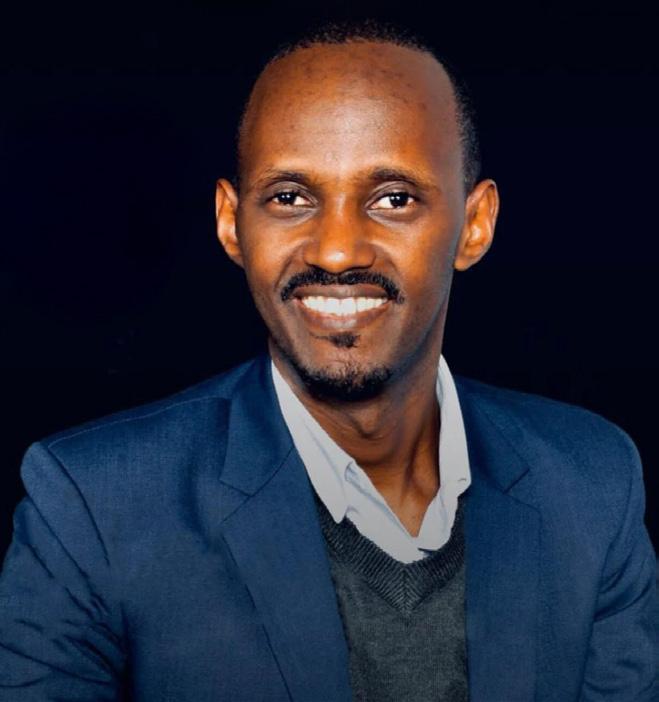
The Rwanda ICT Chamber is facilitating and supporting the robust industry landscape with both local and international investors seeking to tap into the country’s burgeoning technology market. CEO, Alex Ntale, provides insight into expansion plans for the vibrant and evolving sector

Africa Outlook (AO): Firstly, could you talk us through the origins of the Rwanda ICT Chamber, its inception, and initial vision?
Alex Ntale, CEO (AN): The Rwanda ICT Chamber (ICT Chamber) began as part of the country’s private sector federation, which is the equivalent of the Chamber of Commerce in other countries. It brings different industries together and covers 10 chambers, such as manufacturing, commerce, tourism, and agriculture. Previously, our Chamber of Services combined several companies across various sectors. In 2010, when the national strategy started to focus on building an ICT-driven
economy revolving around science and technology for instance, its best efforts turned to specialisations within the Chamber of Commerce, and the companies in the Chamber of Services came together to create the ICT Chamber.
It began with a vision to capitalise on private sector development in ICT and become a leading ICT-driven society with the mission of representing member companies to build a competitive sector.
AO: Since your establishment, how have you developed in terms of your mission and objectives?
AN: We advocate for ICT companies, focusing on policies and regulations through various initiatives, some established by us and others in partnership with different organisations, including the government.
Notable amongst them are the first innovation hub and knowledge lab, built from the vision of developing a knowledge-based economy. These have facilitated entrepreneurs and innovators and have led to a catalytic effect in the ecosystem. Today, we have between 15 and 20 tech hubs in Rwanda as members of the ICT Chamber, and we are creating programmes with them nationwide. We run about six outside Kigali and four in the capital, spread across different sub-sectors and business lines in the ICT industry. The majority of these are software-centric for industry development, whilst some are more on the engineering and computational sciences side, facilitated by our work with academic institutions.
We are building an environment that contributes to the business community and creates bridges for businessto-business (B2B) partnerships. Over the years, we have established beneficial collaborations with neighbouring countries and areas, such as Uganda, Kenya, and the West Africa region, and even work in nations as far-flung as Japan and Sweden, which have helped our ICT sector and digital economy.
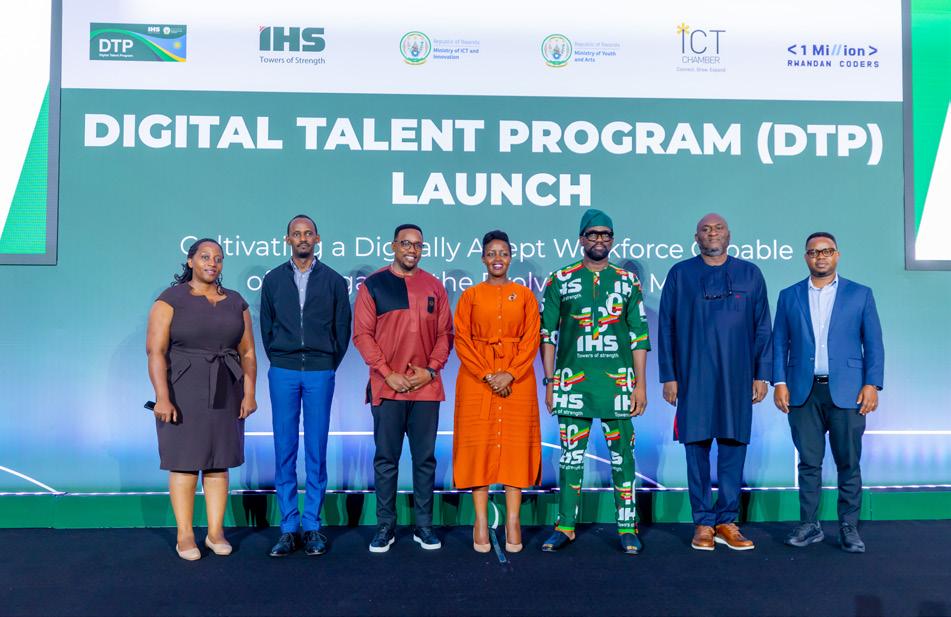


“Throughout my career, I have witnessed the transformative power of data across the healthcare spectrum. From accelerating drug discovery and enabling precision treatments to driving evidencebased practice changes and policy reforms — data’s impact resonates from local clinics to global health institutions. Now, with unprecedented computational power and artificial intelligence (AI)
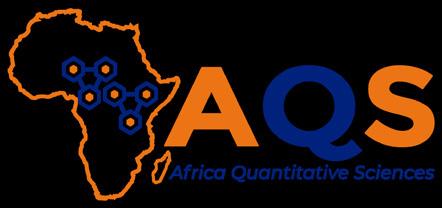
amplifying our analytical capabilities, the potential for data to revolutionise healthcare has never been greater.
“When missing data delayed my son’s autism diagnosis, I felt the pain of waiting and saw the cost of inaction. That’s why I founded AQS – to turn data into a catalyst for swift, lifesaving decisions, so no family or nation endures that delay again.” -Hinda Ruton
“In 2022, I founded Africa Quantitative Sciences (AQS) with a singular mission: to close the gap between data and lifesaving decisions. AQS harnesses data to accelerate life-saving decisions — because every delay costs lives. As a Six Sigma Black Belt and biostatistician behind clinical trials published in the New England Journal of
• Developed Data goatAI to simplify analytics access
• Data goat cut diagnosis times by 40 percent in partner clinics.
• HEIS boosted Rwanda’s horticultural exports by 20 percent in under a year.
• Supported 603 health facilities in 14 days
Medicine, I knew we could turn insights into action.
Today, AQS works closely with regional and national policymakers to avail critical insights that drive healthcare decisions. Our data-driven approach ensures that information is not just collected but actively used to improve
health outcomes. Moving forward, we are setting our sights on precision medicine, where data will play a pivotal role in tailoring treatments and advancing healthcare solutions. Because in a world where every second counts, data shouldn’t just inform decisions — it should drive them.”
• Delivered antibiotic surveillance support at Kigali University Teaching Hospital (KUTH)
At AQS, we do not dwell on challenges — we build solutions, because when data is accessible, connected, and actionable, possibilities are not just imagined — they are realized.
The journey to a data-powered Africa has begun. Join us in shaping a future where innovation leads, and data transforms lives.
In an era where data drives decisions, Rwanda sought to
strengthen its digital health system with real-time insights. Partnering with Resolve to Save Lives (RTSL), we conducted a nationwide survey of 603 health facilities in just 14 days, delivering key findings that informed national strategy, healthcare operations, and long-term sustainability.
A Data-Driven National Strategy
– The Ministry of Health integrated findings into its digital health roadmap, ensuring a structured and informed approach.
Hospitals Accelerated Digital Adoption – Healthcare facilities leveraged insights to enhance patient records, expand telemedicine, and improve service delivery.
Sustainable Digital Health Growth – JHU’s economic evaluation introduced scalable, cost-effective models to support long-term implementation.
At AQS, we believe research should lead to action. By ensuring data is both accessible and actionable, we support the ongoing transformation of Rwanda’s healthcare system — one informed decision at a time.
In high-stakes leadership, guesswork isn’t an option. Yet too many organisations rely on outdated reports, fragmented data, and reactive decisions. Eval360 redefines project governance. With real-time monitoring, automated risk detection, and KPI-driven insights, it transforms oversight into a strategic advantage, ensuring leaders stay ahead, not just informed. Built for scalability and executive precision, Eval360
offers a single source of truth, empowering faster, smarter, and more confident decisionmaking.
Because leadership isn’t about keeping up — it’s about staying ahead. Eval360 makes that possible.
We don’t just publish research — we turn insights into action. Game-changing discoveries happen daily, but without the right tools, they risk being confined to journal pages.
At AQS, we’re training the next generation of researchers through the NextGen Researcher Fellowship, empowering healthcare professionals to turn data into impact. Over 12 intensive weeks, fellows master qualitative, quantitative, and mixed-methods research using DataGoat, AQS’s AI-powered platform that transforms raw data into actionable decisions.
The results are already shifting the landscape:
• Trained 73 fellows across five countries
• 20 secured jobs in data leadership roles
• Ongoing regional collaborations
“With the next cohort underway, NextGen isn’t just a fellowship — it’s the talent pipeline that will define the future of medicine.”
Rwanda’s horticultural sector is growing fast, but efficiency, financing, and logistics remain critical to scaling exports. At AQS, we saw an opportunity to bridge these gaps with the Horticultural Exporters Information System (HEIS), a platform designed to bring structure, transparency, and accessibility to the industry. Instead of managing contracts, compliance, and yield tracking across scattered systems, HEIS simplifies the entire process, giving exporters real-time visibility over their operations. With this data, financial institutions can assess performance more accurately, making financing more accessible to businesses ready to scale. Logistics also becomes smoother, with
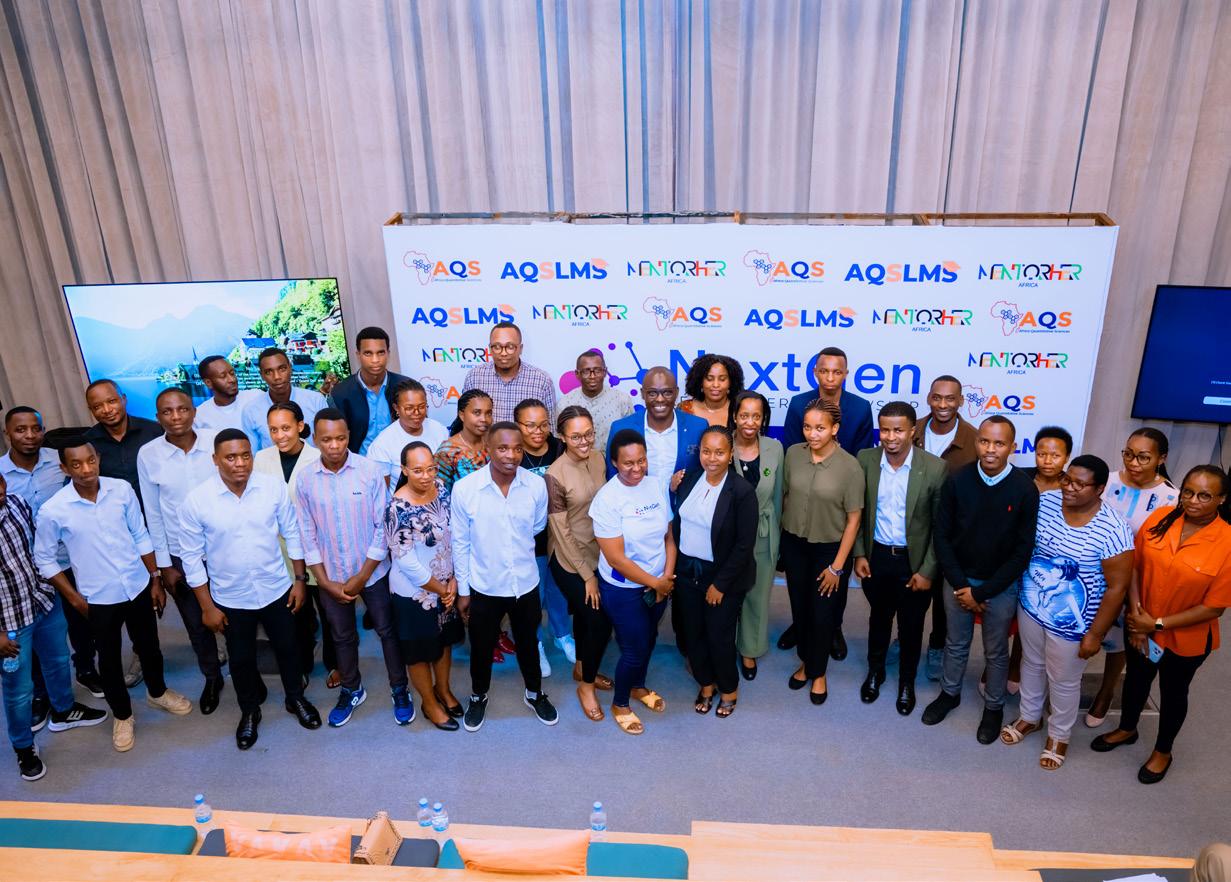
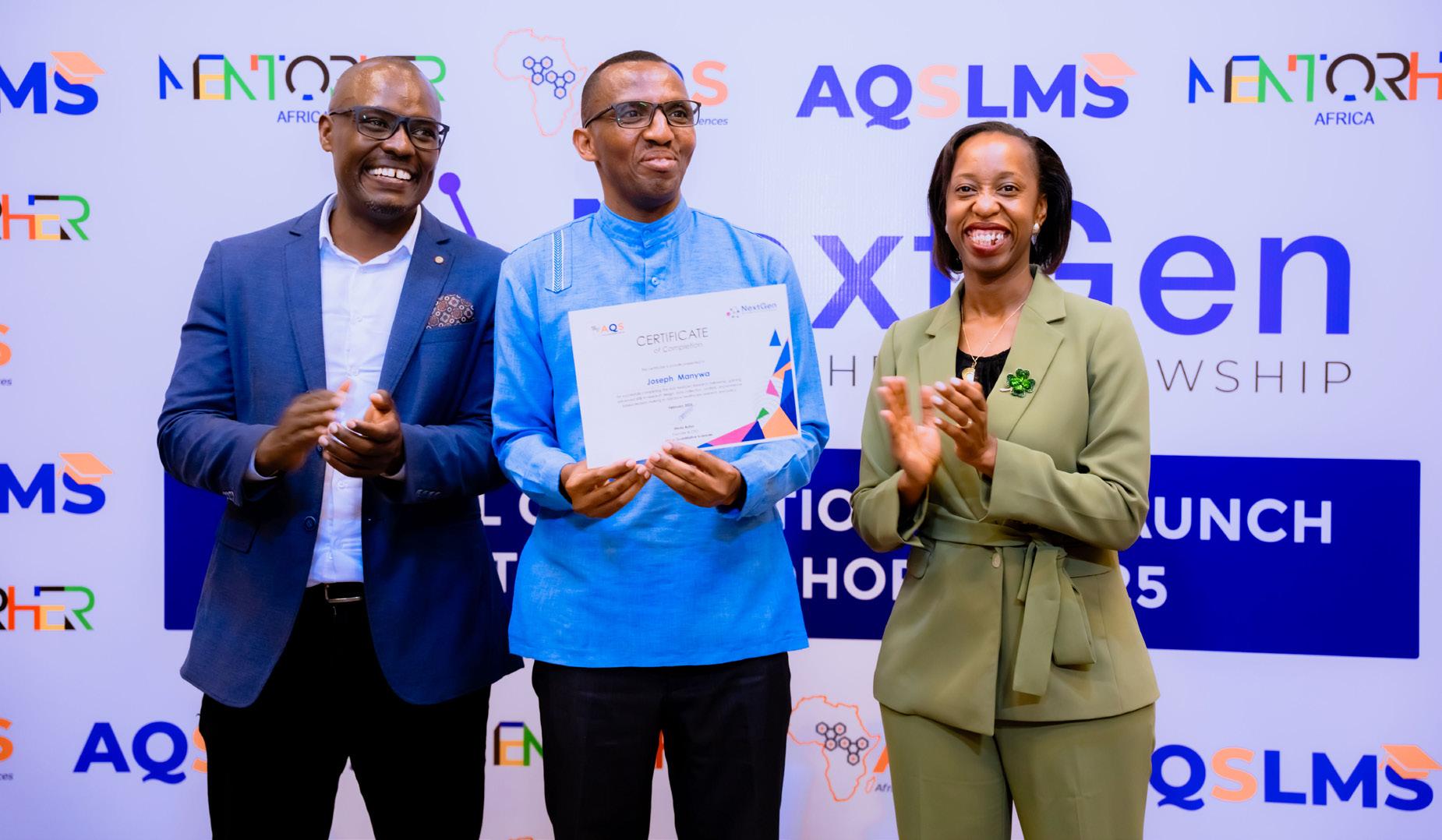
better yield tracking ensuring shipments are planned with precision, reducing delays and strengthening reliability in international markets.
Almond Green Farm is among the first to integrate HEIS into its operations, leveraging the platform to streamline exports and improve market reach. With 20 percent of Rwanda’s exporters already onboarded, momentum is building.
As more businesses adopt HEIS, Rwanda’s horticultural exports are becoming more structured, efficient, and globally competitive.
Partner with us to scale Rwanda’s horticultural export model to your region.
The way organisations handle data today shapes their credibility tomorrow. At AQS, we provide compliance services that establish clear
accountability, strengthen data governance, and proactively manage risk — ensuring organisations stay ahead of regulatory changes.
We have delivered compliance solutions for healthcare institutions, NGOs, and innovation hubs, refining policies so regulations are understood, applied, and seamlessly integrated into daily operations. Our risk assessments identify vulnerabilities before they become liabilities, reinforcing security at every level.
With direct engagement with regulators and advisory bodies, we enable organisations to navigate policy shifts smoothly and maintain compliance without disruption. Whether refining governance structures, training teams, or preparing for regulatory changes, AQS provides the expertise needed to operate confidently in an increasingly data-driven world.
Get in touch to explore how AQS can support your data governance journey.
In healthcare, funding alone isn’t enough—visibility and strategy make the difference. When multiple funders invest in projects without coordination, critical resources get stretched thin, budgets become difficult to track, and impact is reduced. That’s where the Health Resources Expense Tracking Tool (HRET) comes in.
Developed by AQS for the Ministry of Health of Central Africa, HRET provides a realtime, centralised system that tracks every funder, project, and expenditure. This ensures that healthcare investments are aligned with national priorities, eliminate redundancies, and maximise impact.
With HRET, decision-makers can: See precisely where funds are going and who is involved.
Avoid duplications, as every project serves a distinct need.


Optimise budgets based on real-time financial insights. Coordinate effortlessly between funders, executing agencies, and policymakers. By integrating HRET, the Central African government is making smarter, data-driven investment decisions that strengthen healthcare infrastructure and improve long-term planning.
In a sector where every decision impacts lives, HRET transforms financial complexity into a clear, actionable strategy.
“AQS’s HRET turned our budget chaos into a clear strategy — every dollar now saves lives.”
— Dr. Noelly Douma, Ministry of Health, Central African Republic
1KN 78 St, Kigali - Norrsken House Africa Quantitative Sciences Africaqs
+250 788 494 257 info@africaqs.com www.africaqs.com


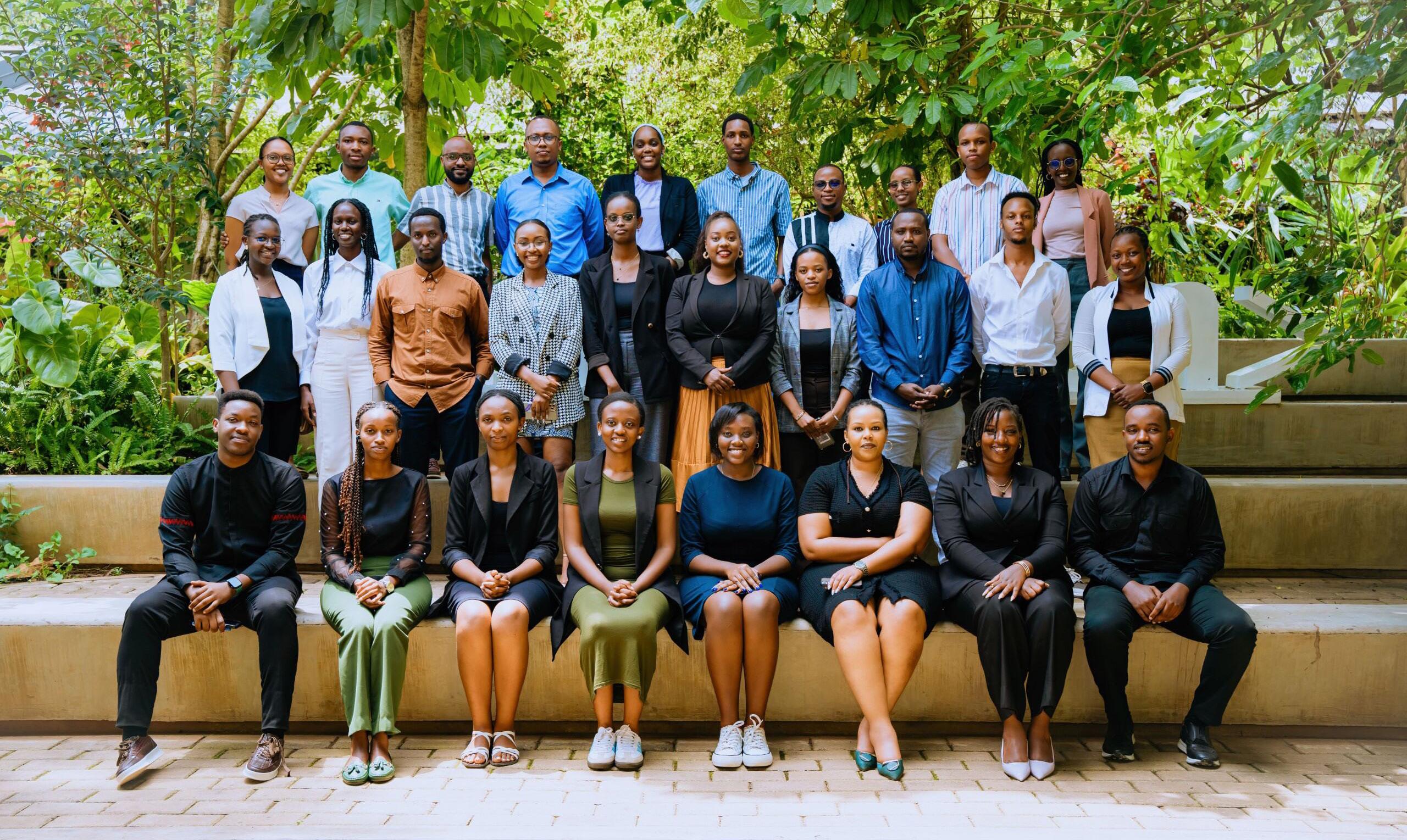

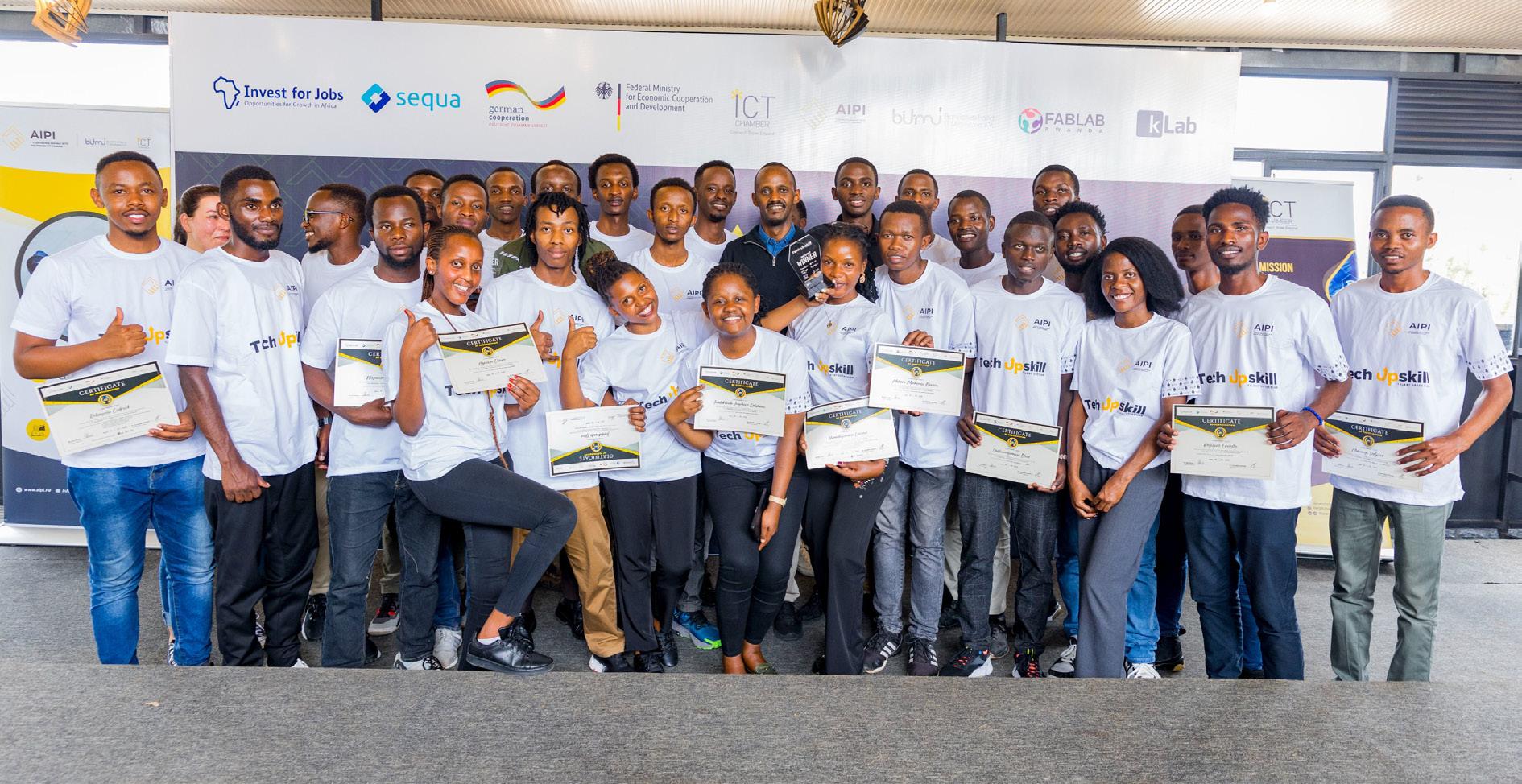
We are seeing an increase in exposure and revenue generated by the industry, with member companies’ products or services distributed throughout Africa, North America, and Europe. Additionally, we see outsourced work from these regions, including Asia, North America, and Europe, as they seek to manage their companies. These connections have proven beneficial to growth and are largely influenced by a conducive environment that instils confidence in investors, ensuring their money is safe.
AO: How is the ICT Chamber navigating the industry’s most exciting and challenging aspects?
AN: Unfortunately, the exciting part resulted from the COVID-19 pandemic, which drove most organisations’ digital transformation strategies. It opened many peoples’ eyes to the relevance of technology, information systems, and connectivity, which has expanded the digital economy sphere, so we are no longer constrained by typical ICT manufacturing or software development issues but rather permeating other sectors, such as the core economic sectors such as trade, agriculture, tourism etc.
For example, FinTech is now influencing various sectors, including energy and agriculture, as nearly all businesses have begun to engage in transactions. This encompasses payments, savings, investments, money transfers, and lending, which are all on the rise. The government has recently launched a FinTech strategy and policy with an ambitious five-year goal, comprising attracting over USD$200 million to the sector, creating between 200

“TODAY, WE HAVE BETWEEN 15 AND 20 TECH HUBS IN RWANDA AS MEMBERS OF THE ICT CHAMBER, AND WE ARE CREATING PROGRAMMES WITH THEM NATIONWIDE”
– ALEX NTALE, CEO, RWANDA ICT CHAMBER

and 300 new companies, and generating 3,500 job opportunities in FinTech. This is exciting because we are already witnessing a positive response from investors, indicating their confidence in the market.
Regulators are also gaining clearer guidance on the
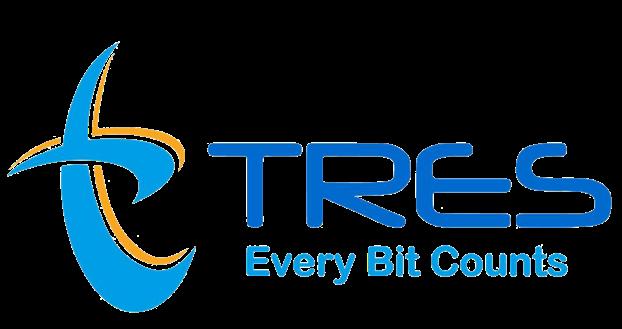
Our vision is to be the leader in providing best-in-class telecom infrastructure services in the eyes of our customers and employees.
WHAT WE DO:
TRES’s “raison d’être” is “getting any Rwandan, and African in general, having access to a flawless and affordable connectivity.”

Trust Engineering Services (TRES), founded in 2009 and licensed by the Rwanda Utilities Regulatory Authority (RURA), holds the distinction of being the second Tower Company supporting Mobile Network Operators (MNOs) in Rwanda. The company was later renamed Tres Infrastructure Limited, continuing under the same license to Build, Own, Operate, and Manage telecom infrastructure. Our mission is to provide comprehensive ICT infrastructure solutions for the nation.
Empowered by capital investment from Admaius Capital, Tres Infrastructure Limited has established a nationwide portfolio of over 200 telecom towers. This strategic growth enhances infrastructure sharing among Mobile Network Operators (MNOs), government agencies, and private organizations, driving significant improvements in operational efficiency.






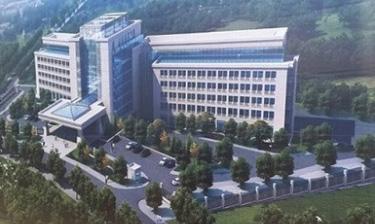
Tres constructs state-of-the-art telecom Towers, Site Analysis & Site Acquisition, permit to build, Project Management and Equipment Installation’s Tower & Power before offering to the MNO’s.
Tres tailor’s the services to the passive infrastructure needs, including site, tower and power supply.
Our Built-to-Suit product provides Ground Based, Roof Top based towers to clients with a variety of solutions customized to their specific needs and capacities.
Tres along with the build offers a seamless operations & power availability to the MNOs
Tower companies generally own or lease tower structures and the associated passive equipment through long-term agreements. Meanwhile, mobile network operators (MNOs) act as tenants, owning and operating their active equipment while leasing vertical space on the tower and portions of the land beneath it for their installations.
This arrangement, known as co-location, involves a single tower structure hosting multiple antennas using multiple technologies as operated by different MNOs
In-building wireless solutions provide comprehensive mobile coverage for indoor environments, addressing issues of weak or nonexistent connectivity often caused by thick walls or steel frameworks.
This technology alleviates the in-premise users experience when unable to make calls or access the internet in their desired locations.
In-building wireless solutions are systems designed to enhance cellular connectivity within buildings or venues. These typically involve the installation of distributed antenna systems (DAS), small cells, or repeaters to ensure strong and consistent signal coverage throughout the premises.

“WE ARE BUILDING AN ENVIRONMENT THAT CONTRIBUTES TO THE BUSINESS COMMUNITY AND CREATES BRIDGES FOR BUSINESS-TOBUSINESS (B2B) PARTNERSHIPS”
– ALEX NTALE, CEO, RWANDA ICT CHAMBER
legal instruments needed for effective oversight. The Rwanda Capital Markets Authority is currently consulting on regulations concerning tokenisation and other essential assets, which previously lacked clarity. However, the situation is improving, and other regulatory bodies
are beginning to align with this progress. As a result, we are witnessing increased activity in the FinTech sector.
The challenges we have faced include a lack of clarity and direction, which hinders progress in the industry. Additionally, we have yet to publish the Start-up Act, which we expect will unlock many opportunities and investment flows for our start-ups, innovators, and entrepreneurs. Fortunately, this act is currently in an advanced stage of development, and through the government, we have engaged with local communities and consulted with other countries that have already established successful policies.
AO: Are there any other key aspects of the industry you would like to highlight, such as e-commerce or skills development?
AN: Skills development is crucial for us, especially after last year’s elections, which brought a new mandate emphasising the creation of employment opportunities in key areas, including developing one million coders and digital citizens. Our goal is to scale up the digital economy both locally and through global opportunities. E-commerce is one area of focus, but we also see significant potential in business process outsourcing (BPO). The demand for BPO services is increasing, mainly due to advancements in AI, provided we ensure the proper empowerment and support.
AO: Looking ahead, what are the ICT Chamber’s plans and goals for the future?
AN: We are dedicated to building and strengthening our digital economy whilst enhancing the competitiveness of our companies. Our goal is to continuously develop a pipeline of talent not only for our members but also for the entire economy. This enables innovators and entrepreneurs to thrive and contribute to the wealth of our country.

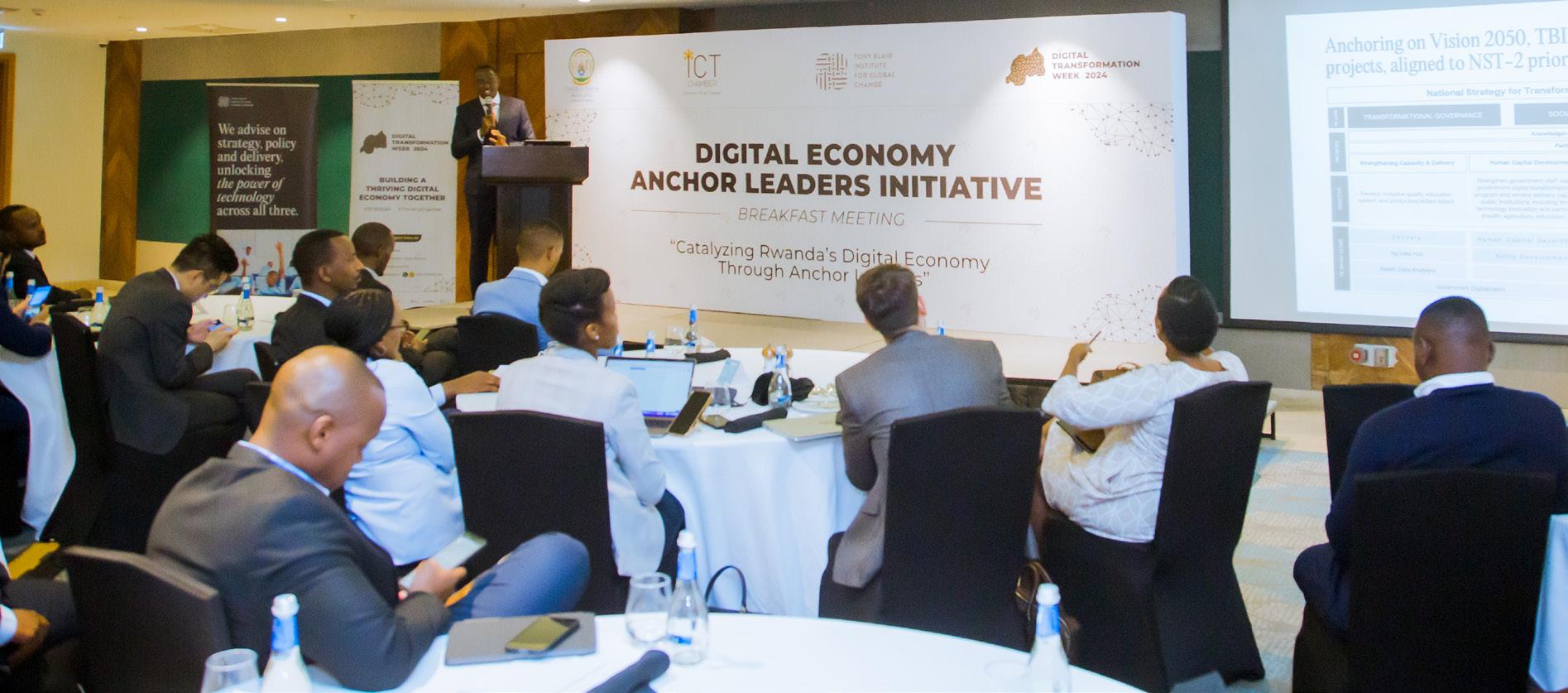


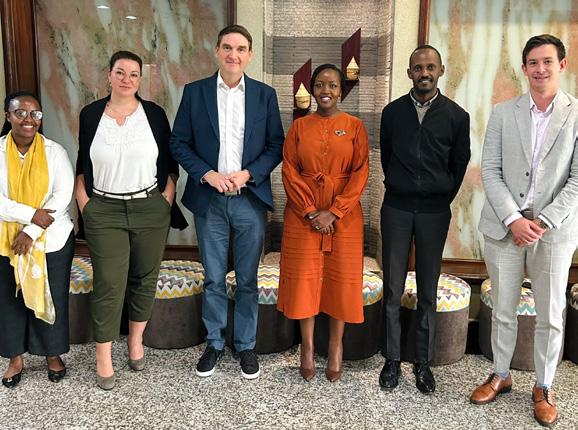
As a leading influence in this sector and the private market, we recognise that 60 percent of our population comprises youth, which presents a significant challenge. We aim to make a difference by providing skills training, fostering the creation of new businesses, and providing opportunities that enhance economic and livelihood prospects for our people.
AO: Finally, how do you see the ICT industry developing in Rwanda over the next five years?
AN: We anticipate the growth in digitisation that escalated during the COVID-19 pandemic will now be at full scale, with no industry left behind, as we are already seeing many sectors become cashless and, therefore, more digitisation in different value chains.
Obviously, financial services is one of the most digitised sectors today, but transport is a cashless space and one of the most digitised industries. We expect this to also scale into other value chains, creating more opportunities for a digital footprint, data analytics, and access to financial services because risk management and estimations will

have improved with digital systems. In the public sector, we are already seeing the government digitising more than 600 citizen services.
More participants from the private sector are joining, which means that over the next five years, the digital economy in Rwanda is expected to create a significant number of jobs. Currently, it contributes between three and five percent to GDP, but this figure is projected to grow considerably. We anticipate an increase in investments in R&D and other science-based initiatives and expect to see hundreds of thousands of jobs explicitly created in the digital space, not including those in ICTenabled sectors. As a result, people’s lives will become increasingly dependent on technology.
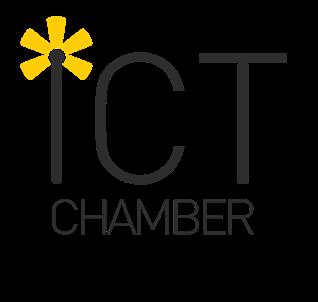
Tel: +250 793902451
info@ictchamber.rw www.ictchamber.rw

